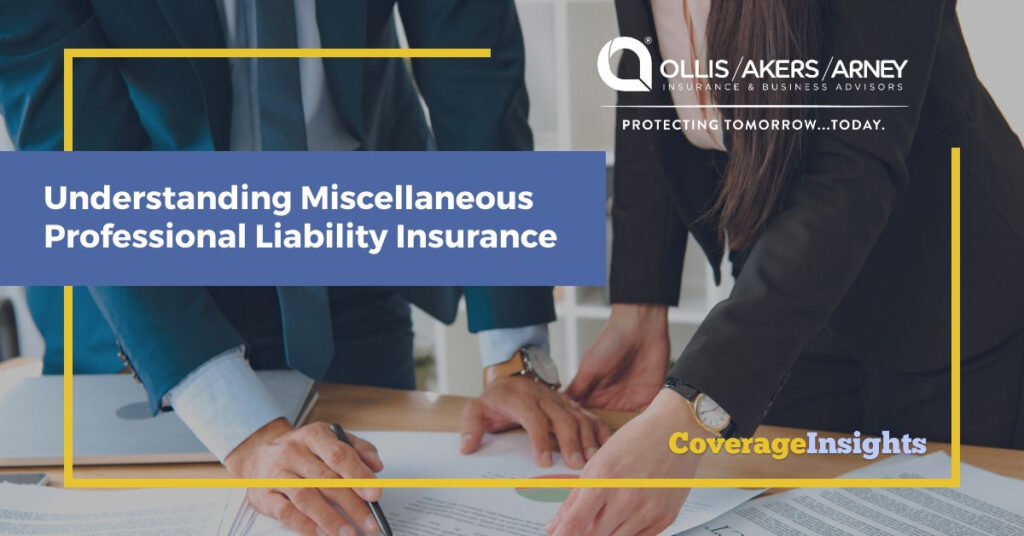Businesses delivering professional services face significant legal risks in today’s lawsuit-conscious environment. Consumers are increasingly holding companies accountable for the advice and expertise they provide, and even minor missteps in delivery can result in costly legal consequences. These risks are not limited to traditional professions like medicine or law; any business offering specialized knowledge or advice is vulnerable to litigation.
Fortunately, miscellaneous professional liability (MPL) insurance, also known as miscellaneous errors and omissions (E&O), can provide coverage for allegations of negligence, errors or omissions that occur in the provision of professional services. Unlike standard professional liability insurance, which is tailored to well-established professions, MPL insurance is designed for nontraditional or emerging fields. It offers a broad-form policy that can be customized to address the unique risks associated with each profession.
This article examines the key policy features of MPL insurance, including typical exclusions and limitations, as well as the types of professionals who may benefit from this coverage.
Who Needs MPL Insurance?
MPL insurance is essential for a wide range of professionals and businesses that provide advice, expertise or specialized support. These include consultants, event planners, marketing agencies, property managers, interior designers and IT professionals. Such professionals typically fall outside the scope of traditional E&O or professional liability policy categories—such as health care providers, accountants and attorneys—but still face significant liability risks.
In addition, many client contracts require proof of MPL or E&O insurance as a condition of doing business, making coverage a strategic imperative for professionals and businesses across sectors.
Core Coverages Provided by MPL Policies
At its core, MPL policies are designed to provide coverage for lawsuits alleging negligence, errors, omissions, misrepresentation or breach of duty in the performance of professional services. If a client claims they have been negatively impacted by a business’s mistake, oversight or failure, the policy can help cover the associated legal defense costs and any settlements and judgments. For instance, a consultant might be sued for providing flawed strategic advice that leads to financial loss; a marketing agency could face claims for misrepresenting campaign results; or an IT firm might be held liable for missing a critical deadline that disrupts a client’s operations.
MPL policies are typically written on a claims-made basis, meaning the claim must be made (and usually reported) during the policy period and arise from acts occurring after the retroactive date.
Many MPL forms provide the insurer’s “duty to defend,” and defense expenses usually erode the policy limit (defense inside limits). This provision is essential, as funding a defense out of pocket until liability is determined can be financially devastating.
Because “professional services’ is the core coverage trigger, insureds should ensure the policy’s definition accurately reflects all the services they provide.
Common Exclusions and Limitations
While MPL insurance offers broad protection, it doesn’t cover all risks. Common exclusions include:
- Bodily injury and property damage (typically covered by general liability insurance);
- Discrimination, harassment, wrongful termination and other employment-related issues (typically covered by employment practices liability insurance);
- Intentional acts, such as fraud or deliberate harm; or
- Promises or guarantees made in contracts, unless specifically endorsed.
- MPL insurance should be integrated with complementary policies, such as general liability and directors and officers (D&O) insurance, to build a more complete and resilient risk management strategy.
Benefits and Value Proposition of MPL Insurance
MPL insurance delivers strategic value to professional service providers in several ways. Consider the following benefits:
- Financial protection—Even the most meticulous professionals can face unexpected allegations and liability claims, and companies can be sued even if they’ve done nothing wrong. MPL insurance provides essential coverage for legal defense costs, whether or not a claim is proven. If liability is found, it can also cover settlements and judgments, helping reduce financial exposure and maintain business continuity.
- Reputation preservation—Losses go beyond legal defense and can include reputational damage, which may have lasting consequences for businesses and professionals. MPL insurance helps mitigate reputational risk by enabling swift resolution of claims and demonstrating a commitment to responsible, professional service delivery.
- Contractual compliance—Professional liability coverage is a common expectation in client contracts. MPL insurance helps professionals and businesses meet these contractual requirements, making it easier to secure and maintain valuable client relationships.
- Competitive differentiation—Having MPL coverage can distinguish professionals and businesses from their competitors. It signals to clients and partners that risk management is taken seriously, and services are delivered with a high standard of care. This can be a deciding factor in competitive bids or partnership opportunities.
- Peace of mind—With MPL insurance in place, professionals can focus on delivering high-quality services without the constant worry of legal fallout. It provides confidence that unforeseen risks are financially covered, supporting stability and continuity.
Steps for Selecting an MPL Policy
Understanding their profession’s specific exposures can help businesses and professionals determine the level and scope of coverage required when selecting an MPL policy. Insureds should review coverage limits, deductibles and key policy features and research the insurer’s claims service track record. They should also understand the policy’s coverage trigger, confirm it is claims-made, check the retroactive date, and evaluate the availability and cost of extended reporting (tail) coverage.
Businesses and professionals could enlist the help of a broker with expertise in professional liability and E&O insurance. Brokers can help insureds compare policy wording, identify limitations or exclusions, and negotiate favorable terms. They can also guide clients in selecting appropriate limits and deductibles that manage premium costs without compromising coverage.
Conclusion
MPL insurance provides robust financial protection for a diverse range of professionals across sectors, helping to shield them from claims of negligence, errors, omissions and other professional liabilities. Businesses and professionals may also benefit from additional lines of coverage, such as general liability and D&O. A coordinated approach across these policies can help close coverage gaps and provide financial protection against a broader spectrum of liabilities. Contact Ollis/Akers/Arney Insurance & Business Advisors today to find out more.
This Coverage Insights is not intended to be exhaustive nor should any discussion or opinions be construed as legal advice. Readers should contact legal counsel or an insurance professional for appropriate advice. © 2025 Zywave, Inc. All rights reserved.


